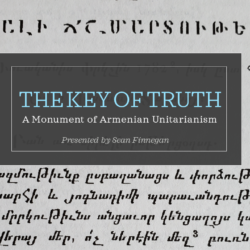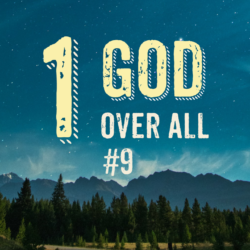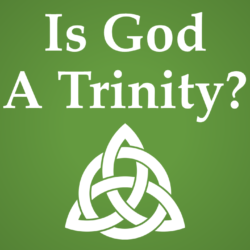How much does truth matter to you? In particular, how should we think about Christians who hold very different views on key subjects? For example, I’m a biblical unitarian, someone who believes that we should take Jesus literally when he called his Father “the only true God.” Of course I believe Jesus is God’s only begotten son, the anointed Messiah who died for our sins, but I don’t affirm the fourth century doctrine of the Trinity. Some Christians would call me a heretic beyond the pale of fellowship or even salvation (even if I do believe the gospel message with all my heart). Others would say I’m deceived but would have no problem working together in various areas. Chuck Whitlock, a bible student, husband, and father of five has been wrestling with precisely these questions over the last 5 or so years. Having grown up in strong evangelical denominations his whole life, he had to rethink his relationship with mainstream Christianity when he began changing several of his key beliefs. In this interview, we discuss various ways to think about this issue, based on Whitlock’s paper (see below). He steaks out a balanced position between writing everyone off who disagrees with him and accepting everyone as brothers and sisters without regard for their beliefs.
—— Links ——
- Read Chuck Whitlock’s entire paper below
- Email him at chuckw@whitlox.net
- Check out his blacksmith forges
- For Dale Tuggy’s presentation on John Locke’s minimalist definition of Christians based on the simple confession that Jesus is Messiah, see Heretic! Four Approaches to Dropping H-Bombs
- For more on biblical unitarianism, check out these podcasts, especially Podcast 44: The Immutable Shema as well as christianmonotheism.com
- More info about KingdomFest (Sep 7-9, 2018)
- Intro music: Jazzy Frenchy by bensound.com. Licensed under Creative Commons: By Attribution 3.0 License.
Does Truth Matter?
Truth matters!
… but how much?
Introduction:
There is a significant distance between the Biblical Unitarian faith and ‘orthodoxy’ in its various forms.
If you haven’t come to this conclusion, just try to advance the idea that Jesus is not God and see what kind of reception this gets:) Even less divisive topics, such as resurrection or the gospel of the kingdom, meet with great opposition.
The apparent incompatibility between Biblical Unitarianism and ‘orthodoxy’ causes one to wonder what it means that other Christians don’t seem to be interested in the truths we’ve discovered.
Both parties reference the same book and so there is something very familiar in ‘orthodoxy’.
A little scholarship shows us how ‘orthodoxy’ represents the Hellenization of the original Jewish Christian faith. Most of the terms and characters are retained but the meanings are either co-opted or obscured such that, today, in very real terms, they have a different Jesus, a different God, and a different Gospel.
How much does that matter?
What does it mean?
Who is saved?:
I recognize that this bumps into the impossible question of who is truly saved. That subject shadows this topic, but because we don’t have access to such binary solutions I’m going to side step that question and focus on how elevating the significance of the truth affects our relationship with the ‘orthodox’ and the scriptures.
Even if we can’t know who is saved, we still have to adopt a stance that assumes either;
- -the ‘orthodox’ are brothers (though in error), who are therefore close to us, or,
- -they are quite distant, and possibly outside all together, to be approached like any other heathen.
The questions:
- Should we consider those with a self confessed different God, Savior, Gospel, and Hope, our brothers? In doing so are we subtlety affirming a falsehood? By treating them as brothers do we fail to adequately warn them of the danger they are in? Are they in danger?
There is a mutual incompatibility in saying the truth of God really matters, and including as brothers all ‘Christians’ who do not have those truths.
If you elevate the significance of truth you automatically take to task those who deny it.
If they are brothers then the truth can’t matter that much.
Since you can’t know who is actually your brother, are we talking about social issues? Affiliation and association? Perhaps it is about who we TREAT as brother. Is it possible to know that some are saved and are being saved in the ‘orthodox’ camp, but refuse to associate because of their great error?
- . What does it mean that so few are interested in the truth?
- The Biblical Unitarian position is obvious and rests on solid foundations, yet very few ‘orthodox’ folks are interested. Why?
Two positions on the relationship between truth and salvation:
Looking into the scriptures in order to determine if we are being faithful to the Apostles in who we call ‘brother’, there seems to be a spectrum of evidence;
The Low Bar:
The inclusive position takes note of the formulas for salvation in the scriptures that are simple.
Rom 10:9-17 NIV That if you confess with your mouth, “Jesus is Lord,” and believe in your heart that God raised him from the dead, you will be saved.
Joh 3:16 NIV “For God so loved the world that he gave his one and only Son, that whoever believes in him shall not perish but have eternal life.
John 6:47 NIV I tell you the truth, he who believes has everlasting life.
Believe on the Lord Jesus and you will be saved (Acts 2, Acts 16). This is magnificently inclusive, and unless you insist on qualifying what ‘belief in Jesus’ means, it would include just about every Christian and pseudo-Christian group out there.
This position would make the differences between us and ‘orthodoxy’ a matter of degree. Perhaps we have journeyed further into the truth than they have, but we are both in the same family and are on the same journey.
The inclusive perspective would view ‘orthodoxy’ as something that is relatively intact with only the need for improvement.
The Exclusive Position:
There are other passages that describe a much more exclusive view of the truth.
1Co 15:1-4 NIV Now, brothers, I want to remind you of the gospel I preached to you, which you received and on which you have taken your stand. (2) By this gospel you are saved, if you hold firmly to the word I preached to you. Otherwise, you have believed in vain.
Paul is clear that he believes salvation comes through the specific word he preached, without which the aspirant has no hope.
Gal 1:6-9 NIV (9) As we have already said, so now I say again: If anybody is preaching to you a gospel other than what you accepted, let him be eternally condemned!
Paul is not sanguine about ‘a different gospel’ in Galatians either. He damns the preacher of another gospel repeatedly, leaving no doubt about the significance of the truth in his eyes. If modifications to the gospel held no peril, why the vehemence?
1Jn 4:5-6 NIV They are from the world and therefore speak from the viewpoint of the world, and the world listens to them. (6) We are from God, and whoever knows God listens to us; but whoever is not from God does not listen to us. This is how we recognize the Spirit of truth and the spirit of falsehood.
John is unapologetic about knowing and representing God’s truth. He tests others by whether or not they listen to him, declaring them ‘not from God’ if they will not listen.
2Jn 1:9-11 ISV Everyone who does not remain true to the teaching of the Messiah, but goes beyond it, does not have God. The person who remains true to the teaching of the Messiah has both the Father and the Son. (10) If anyone comes to you but does not present his teachings, do not receive him into your house or even welcome him, (11) because the one who welcomes him shares in his evil deeds.
John, having just spoken about the centrality of love, rejects anyone who does not ‘remain true to the teaching of the Messiah’, and commands a strong social separation lest you ‘share in his evil deeds’.
It is interesting to imagine transporting Peter, Paul, or John to our day to watch their reaction to the state of Christianity. Personally I can only imagine them to be distraught and impassioned over how very far we’ve drifted from what they were faithful to preach. There can be no doubt that “three who are god” is not Yahweh, the incarnate god hybrid is not Jesus, and heaven for immortal souls is not the gospel… ‘orthodoxy’ has not remained true to the teaching of Messiah.
Argument:
The Biblical Unitarian distinctive seems to be the approach to scripture that tries to understand and respond to the true voice of Jesus and His Apostles, to believe what they believed.
With such a foundation, the convictions of the Apostles must be our guide or we risk hypocrisy.
This is the heart of my argument; the same method and foundation that leads to the gospel of the kingdom and a unitary theology and a ‘second Adam’ christology, also dictates separation from those who contradict the words of the Apostles.
As uncomfortable as it might be, can we be true to God and call ‘brother’ someone with a ‘three who are god’ god, a god/man hybrid messiah, and a heavenly hope for immortal souls (let alone the eternal fiery roasting of the damned)?
If we call the ‘orthodox’ brothers, I don’t think we can be true to Jesus and His Apostles.
What did the Apostles really believe?:
Unless the scriptures are in conflict with one another, harmonizing them suggests the exclusive position is a better reflection of the Apostles views. This means that we are forced to qualify ‘belief in Jesus’ in order to reconcile it with the more adamant teachings. ‘Belief in Jesus’ must then become synonymous with ‘listening to John’ and ‘holding firmly’ to the gospel Paul preached, and ultimately, clinging to ‘the words of Messiah’
Counter Argument:
Perhaps you can grant the Apostles their vehemency, but define what they are upset about to be something other than the points Unitarians and ‘orthodoxy’ disagree on. Perhaps it is enough to have an ‘orthodox’ understanding of God, Jesus, and the Gospel, as long as you retain elements such as ‘salvation by grace through faith’ and aren’t legalistic. Maybe what they meant by ‘another gospel’ was something more extreme than the differences between Unitarians and ‘orthodoxy’, something more like the Unitarian Universalist’s beliefs.
Is it valid to include the errors of ‘orthodoxy’ in the ‘another gospel’ category that had Paul so upset?
It seems to me that getting the nature of God, His Son, and His promises wrong qualifies if anything does.
The real problem:
There is a cultural affinity between Biblical Unitarians and ‘orthodoxy’ that works both for and against us. We could easily mistake the similarities for actual fellowship. This is complicated all the more by the ignorance and lack of clarity within the ‘orthodox’ camp. Generally they are terrible trinitarians, leaning toward modalism most of the time, their ideas about the destiny of the Saints are muddled and can seemingly accommodate our views (unless you tell them they are not inherently eternal), and the Kingdom is so vague in their minds the conflict is one of finding a functional definition rather than competing views. The fact that the ‘orthodox’ might accidentally agree with you does not fix the problem, because the real problems are epistemology and discipleship, not the actual points of doctrine.
Foundations:
The Biblical Unitarian position rests on a foundation of ‘believing what Jesus and the Apostles believed’. It is a position that rejects the idea that ‘Biblical’ means ‘any idea you can find words in the Bible to support‘.
It is not valid to use the words of the Apostles to support ideas they themselves did not have.
This is the true gulf between Biblical Unitarians and ‘orthodoxy’.
The answer to the meaning of the distance between us, when we seem to have so much in common, is this division of loyalties. How can ‘orthodoxy’ promote a post Apostolic theory, that has no clear teaching in scripture, as a doctrine necessary for salvation? They do it by abandoning loyalty to the Apostles and promoting the Church and its creeds and traditions as the ultimate authority on doctrine. The trinity is the acid test of ‘orthodoxy’ because it is a test of loyalty to the Church. If you will submit yourself to mystery, you are well prepared to bow your knee to the enlightened priests of that church.
Discipleship:
The pursuit of truth is a discipleship issue. As a follower of Jesus, you are supposed to care about what He thought, taught, and commanded. When you claim to love God you must also demonstrate that you listen to Him.
For those of us who left ‘orthodoxy’, our accomplishment is not a great intellectual feat (though there is some work to be done). Our discoveries are in fact the most basic facts of the faith. Congratulations! With years of study and the application of your penetrating intellect, you have discovered that God is One and Jesus is His Son!! No, our accomplishment is a triumph of devotion, our willingness to pay the social price for challenging those defining doctrines and being willing to cross the line for Messiah’s sake. We were willing to go where ever the truth took us. Our boast should be in our humility:)
We should not take from the ‘orthodox’ the burden of discipleship by pretending there is no great distance between us.
Humility:
Much of this argument rests on the level of confidence you have in knowing that you possess the truth.
Do you know?
I’m not sure that academic self doubt and scholarly skepticism has a place in presenting the truth. Saying ‘I might be wrong’ does seem humble, but…
…ARE YOU WRONG?
If we aren’t wrong, we need the boldness that comes with that solid foundation.
Yes, we were wrong in the past, and, no, we are not infallible. Its not about arrogance, it is about humbly receiving what was handed down to us.
Is what we believe clearly communicated? Do we possess supernatural reading comprehension? No, we are merely believing what another wrote to us. In this case, the humble position is to acknowledge that you are right in simply believing the Apostles.
Balance:
To be clear, while I advocate NOT calling the ‘orthodox’ brothers because it cheapens truth and likely puts us at odds with the Apostles, I’m also NOT suggesting that we relegate them to a derogatory category.
If we divorce ourselves from the ‘orthodox’ family, do we then have to declare them our enemies? I don’t think that is how it works. A lack of love on our part would suggest we do not possess the truth.
Can we pursue the truth fully while humbly acknowledging that we don’t know who is saved?
Surely it is possible to both hold a high view of truth, AND to allow our ignorance of peoples hearts and their ultimate destiny remain.
We need to recognize and value the attempts of others to follow God as they understand Him AND challenge them to a better understanding.
There are hard hearted wicked souls in the ‘orthodox’ camp too. You might not get burned at the stake these days, but we should recognize the limits when we reach them. It is not true that everyone in ‘orthodoxy’ is waiting eagerly for the Biblical Unitarian truth to be revealed.
I’m not promoting bullish dogmatism or unkind closed mindedness. I’m suggesting we be less distracted by ‘orthodoxy’ and more free of it.
Being a Biblical Unitarian is no guarantee that your name is in the Lamb’s Book of Life. It is possible to have the facts of the faith correct and miss the heart of it. A highly polished set of doctrines does not a living faith make. Doctrinal purity may actually be lower on God’s list than loving kindness, victory over sin, and a heart of faith.
We all started with a simple faith in a God who loves us and offers us life in His Son… a free gift received by faith. Was it enough? Was it invalid because it happened in an ‘orthodox’ church? Did we need a comprehensive biblical theology at that moment?
Is there an important distinction between seeking God and seeking the truth about Him?
1Co 8:1-3 NIV Now about food sacrificed to idols: We know that we all possess knowledge. Knowledge puffs up, but love builds up. (2) The man who thinks he knows something does not yet know as he ought to know. (3) But the man who loves God is known by God.
Ironically, it seems possible to focus on knowledge to the point of ignorance and error.
Many of us with a history in ”orthodoxy” can attest to the fact that we were sincere disciples long before coming to the truth of the One God. God disciplined and grew us for many years before unitary insights came.
I’m not tempted to believe our conversion experiences were invalid or that our years of service count for nothing.
I’m confident that there is a process component to ‘being saved’. There is plenty of room for patience, recognizing the sometimes lengthy process that is involved in exiting false doctrines.
Any stance, however doctrinally pure, that is arrogant or self righteous, that throws out ‘anathemas’ in all directions, is not a reflection of the true faith either.
Identity:
Part of the question of how to relate to ‘orthodoxy’ is about identity.
For those of us who have left orthodoxy there is more than a bit of an identity crisis. There is no alternate thriving and available institution to join and it leaves us out in the cold. Perhaps there is a similar experience for JW’s who awaken to the Biblical Unitarian faith. It is as though we can’t avoid relating to what we left, as though there were an irresistible urge to fix it. It seems as though we have had an identity something like ‘post orthodox’ or ‘previously orthodox’, (or in the case of my family, ‘heretic’) or some other blend that doesn’t quite stand on its own, always having some reference to ‘orthodoxy’. (I’ve used the parenthetical ‘orthodox’ this entire document, because that is their identity, but I’m not willing to grant them that high ground.)
The Biblical Unitarian crowd that I’ve encountered so far is very much missing that rugged, vivid, and self standing identity. Rummaging around in history doesn’t seem to provide it, and classic Unitarian denominations don’t quite do it either.
We need that solid identity. My children need something besides ‘heretic’ as their Christian label (though they do enjoy the irony).
There is something broadly appealing in a bold and authoritative stance. It suggests that the truth is alive in us. If we truly do know who we serve, if His promises have taken hold in our hearts, there is no room for an alliance with (or apology to) the misinformed. Our identity needs to be distinct from ‘orthodoxy’ in every way.
There is more to following God than constantly worrying over the trinity or whatever else separates us from ‘orthodoxy’. Identities bases on opposition (anti-this, anti-that) are stunted and stunting. We need to adopt our healthy post-‘orthodoxy’ identity, wrest the word ‘Christian’ away from them, and get on with it.
Finally:
Does ‘orthodoxy’ just need ‘sprucing up’? A bit of paint here and there, some polish perhaps?
If we can’t call ‘orthodoxy’ false, what do we have to offer them?
The greatest adversary of Jesus’ ministry was the religious establishment of His day… those that claimed to have an interest in God, to represent Him and the things of God. Sound familiar?
As in Jesus day, the problem between us and ‘orthodoxy’ is fundamentally one of loyalty; ‘church authority’ on the one hand and Apostolic doctrine found in the scriptures on the other.
You are not going to get along with the ‘orthodox’ if you insist on Apostolic truth.
You will only ‘fellowship’ if you are willing to compromise in some way.
Practically, you can not fellowship when your ideas are incompatible. You can have a semblance of fellowship with the ‘orthodox’ by constantly running a translator in your head, and ultimately, by keeping your mouth shut, which is no fellowship at all.
If you treat the ‘orthodox’ as brother, it lowers the tension between truth and falsehood and subtly undermines the impulse to minister to them (they don’t really need it after all). It assumes they are not in peril, a position that doesn’t account for the vehemence of the Apostles and the teachings of Jesus.
Inclusiveness undermines our care and concern for them, even though the foreign doctrinal system of ‘orthodoxy’ cuts its adherents off from the sanctifying power of the Good News!
Where does the power to ‘purify yourself’ come from when you fail to believe that you will be ‘like Him’ when He appears (if you even believe He will appear)!? How can you make ‘every effort’ to add “goodness, self-control, and brotherly love” when you are cut off from His ‘divine power’ because of your lack of knowledge of His ‘precious promises’?!
There is a great gulf between Biblical Unitarians and ‘orthodoxy’. It is true that most orthodox evangelicals today would find our position very familiar should they ever make the journey, but we should not make the mistake of underestimating that journeys distance or difficulty.
Our message to the ‘orthodox’, as well as the heathen, should be ‘repent and believe’, something we are unlikely to say to a brother.
We need to become less distracted by the various ‘orthodox’ churches of today, less jealous of their institutional successes. We need to fully detach ourselves from compromised faiths and boldly go on with the truth.
If this is an unsatisfying treatment of these subjects I do apologize. It is merely the truth of my personal struggle revealed.
Chuck Whitlock
chuckw@whitlox.net







Excellent article and interview, Chuck! It seems we began our journey about the same time 5 years ago. Your having children (as I also do) really presents a challenge. We can’t just go along pretending all is normal, and then go home after an “orthodox” church time and spend the rest of each Sunday telling the kids how all that was taught and preached is wrong. That defeats the idea of going to church, and will ultimately ruin the children.
Like you, I came out of a conservative Baptist background, having studied my way out of it, unintentionally, I should add. I can totally relate to your struggles.
My policy for fellowship is that if they walk like a true Christian and talk like a true Christian, I will loosely assume they are true Christians and are merely deceived as I once was. But most who pose as Christians are merely cultural Christians, so we have to keep that in mind also.
We have mostly opted to home-church, listening mostly to Living Hope in NY. But our children need friends, and so do we, so we have a tension about what to do for church. If there was at least one Biblical Unitarian in our area (North Texas) I would be willing to do door-to-door visitation and start a work. I am praying for that to come to pass. Blessings.
The kids really do add weight to these questions, don’t they?
We did the thing you describe wherein we tried to go to church and then argue against everything said on the way home! Lol! There was significant family tension over the risk of becoming ‘those people’ that oppose everything, stand for nothing, and have no humility or submission. Our kids definitely went through those identity phases of ‘our family is the sole arbiter of truth’, even though we opposed it.
I think we ended up OK on those questions (the kids are old enough to reflect on it themselves).
We worried that our ‘heretic’ children would never find mates, that the price of truth would be permanent loneliness and isolation, but we have corrupted enough of their friends that there has been one wedding and probably another in the not to distant future (hurray!).
I like your policy for fellowship… I’m not sure we can do anything else.
First off, I just want to lead with I am a long time listener to the podcast. I’m pretty sure I have been listening since episode 1. Sean does an excellent job with this podcast. Not only does he try to spread truth and engage in all aspects of our current culture but he does a great job introducing his listeners to material that is outside their purview. This is one of the most exciting elements to this podcast is the vast wealth of information, sources and groups that I have become familiar with while listening. The recent series on Calvinism was a great introduction for me to view TULIP from a Calvinistic perspective. The theological episodes as well as the episodes engaging culture and more grass roots areas of areas have been beneficial to me in my own life and spiritual walk. I would encourage others to listen and learn and I encourage Sean to keep up the good work of the gospel. May we run with endurance the race set before us.
I want to thank Chuck and Sean for a very informative interview. I am one who never gave too much thought about Trinitarianism or Unitarianism, but even as a small child when first being told about the birth of Jesus, it made sense to me that Jesus was the Son of God not God the Son. An interesting story is that I had lunch not long ago with pastor at our local church which is part of Foursquare. He had invited me to lunch, because I had expressed that I really believed in a God the Father and His son Jesus Christ. Since that Unitarian view is not shared in that denomination, I gave him some written material the week before lunch and then we had some discussion and he was very understanding. On the light side, he came to me the next Sunday and pulled me aside kind of chuckling. He said that when he had gotten home from our lunch, his wife had asked how it went, and he proceeded to tell her our discussion and my thoughts on the the orthodox trinity. Then he said that his wife said right away that she agreed with me and that is how she had always thought also with there being God the Father, and his Son Jesus Christ and a Holy Spirit. There are so many verses in the bible pointing out God as the Father and Jesus’ obedience to his father that it went pretty smooth in our lunch. I know already that I am a little bit non orthodoxy being pretty much a Unitarian with a non violent belief much like Anabaptists.
That being said, I do appreciate your insight Chuck into your situation. I agree that being true to the apostolic beliefs of that first century is a great guide. God bless.
Thanks!
About two years ago, I began asking questions as a homeschool mom about our culture’s fascination with the Greeks. Initially, I just was looking into the field of education and specifically into history curriculums. I never expected my initial inquiries to lead me into foundational theologies of the “Church.” I find that there are few if any that are interested in following me down this road of inquiry, and so I find myself asking this exact question, “Does the truth really matter?” I don’t want to cause an unnecessary stir; but if it matters, I need to say something – but how? How do I convey the truth without blasting everyone out of the water? Thank you, Chuck for taking the time to disseminate your thoughts. I was encouraged to hear that I can share what I have learned about the truth in love. I, too, have sort of put feelers out to see if others are interested in hearing more. Too many times, my comments fall on deaf ears. But I keep praying that God will bring people into our lives locally with whom we can fellowship. Going this alone is very isolating.